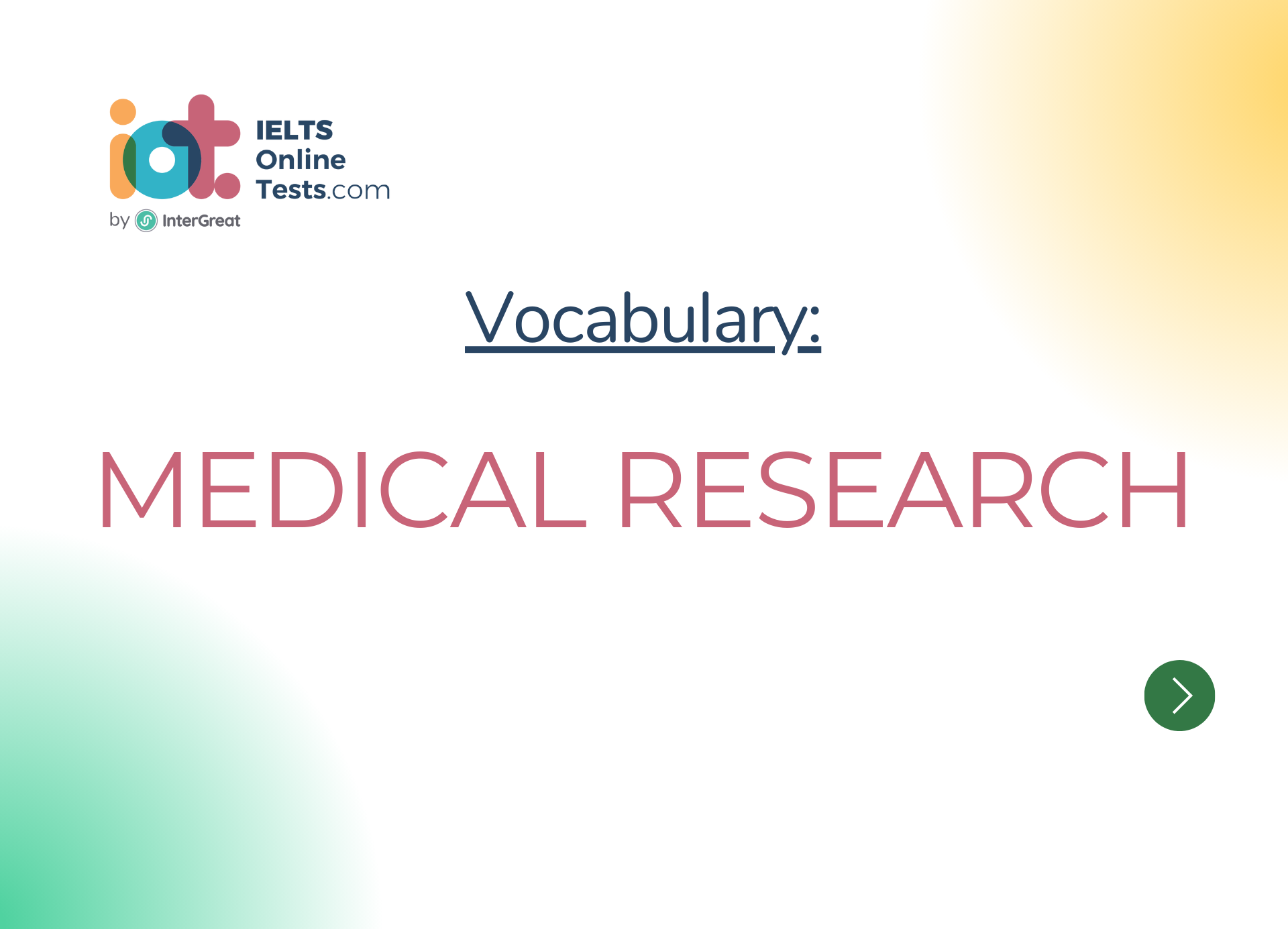
Medical research
Below is a detailed list of vocabulary related to medical research, along with their definitions. Understanding these terms will help you discuss various aspects of medical research during the IELTS exam or any conversations related to medical studies.
Clinical Trial:
- Definition: A research study conducted on human participants to evaluate the safety and efficacy of medical treatments or interventions.
Randomized Controlled Trial (RCT):
- Definition: A type of clinical trial where participants are randomly assigned to different treatment groups to compare the effects of various interventions.
Placebo:
- Definition: An inactive substance or treatment given to a control group in a clinical trial to measure the actual treatment's effectiveness.
Double-Blind Study:
- Definition: A clinical trial in which both participants and researchers are unaware of the treatment assignments to minimize bias.
Meta-Analysis:
- Definition: A statistical analysis that combines data from multiple studies to draw broader conclusions and identify patterns.
Observational Study:
- Definition: A research study that observes and analyzes participants' behaviors or outcomes without any intervention.
Cross-Sectional Study:
- Definition: A type of observational study that collects data from a specific population at a single point in time.
Longitudinal Study:
- Definition: An observational study that follows participants over an extended period to examine changes or developments over time.
Systematic Review:
- Definition: A comprehensive review of existing literature on a specific research question to summarize evidence and draw conclusions.
Informed Consent:
- Definition: The process of providing participants with comprehensive information about a study's risks and benefits before they decide to participate.
Ethics Committee:
- Definition: A group of experts responsible for reviewing and approving the ethical aspects of medical research studies.
Protocol:
- Definition: A detailed plan outlining the objectives, methods, and procedures of a research study.
Sample Size:
- Definition: The number of participants or subjects in a study's sample, which affects the study's statistical power and generalizability.
Data Collection:
- Definition: The process of gathering and recording information or measurements for analysis.
Data Analysis:
- Definition: The statistical and qualitative examination of data collected during a research study.
Hypothesis:
- Definition: A testable statement or prediction that guides a research study's objectives.
Confounding Variable:
- Definition: An extraneous factor that affects both the independent and dependent variables in a study, potentially leading to biased results.
Peer Review:
- Definition: The evaluation of research papers by experts in the field before publication to ensure the study's quality and validity.
Publication Bias:
- Definition: The tendency to publish research findings that show significant or positive results, leading to an incomplete representation of the research landscape.
Statistical Significance:
- Definition: The likelihood that an observed result is not due to random chance but has practical or meaningful implications.
Institutional Review Board (IRB):
- Definition: A committee responsible for reviewing and approving research involving human subjects to ensure ethical standards are met.
Data Validity:
- Definition: The extent to which collected data accurately measures the study's intended variables or outcomes.
Data Reliability:
- Definition: The consistency and reproducibility of results when data collection is repeated under similar conditions.
Cohort Study:
- Definition: An observational study that follows a group of individuals with a common characteristic or experience over time.
Case-Control Study:
- Definition: An observational study that compares individuals with a specific condition (cases) to those without the condition (controls).
Cross-Over Study:
- Definition: A study design where participants receive different treatments sequentially, with a washout period in between.
Publication Ethics:
- Definition: The ethical principles and guidelines that govern the publication of research findings in academic journals.
Interventional Study:
- Definition: A type of research study that involves actively changing or administering treatments to participants.
Retrospective Study:
- Definition: An observational study that analyzes existing data or records to investigate past events or conditions.
Prospective Study:
- Definition: An observational study that follows participants from the present into the future to observe outcomes as they occur.
Please note that medical research encompasses various study designs and methodologies, and these terms provide a foundation for discussing and understanding different aspects of medical research during the IELTS exam or any healthcare-related conversations.




